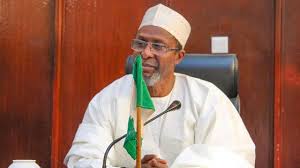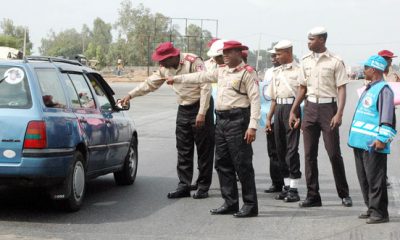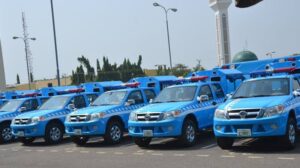Metro
FRSC to Deploy 2,078 Personnel, Ambulances for Easter Patrol in FCT

The Federal Road Safety Corps (FRSC) FCT command, on Tuesday said it would deploy 2,078 personnel for the 2022 Easter patrol operations in the territory to have hitch free celebration.
Mr Oga Ochi, the FCT Sector Commander said this in an interview with newsmen in Abuja that larger number of people move in and out during the festive period, hence the need for massive deployment.
He said that the command would also be deploying 37 patrol vehicle operations and 12 life support ambulances for the Easter patrol operation.
According to him, as usual, we have regular marshals which are 2,078 that are going to be deployed along with Special Marshals to work with them.
“We are also collaborating with other sister agencies like NEMA as they will be working closely with us and also Nigerian Police among others.
“We have about 37 patrol cars in the city centre, unit commands and in all other outskirts in FCT and all these shall be deployed.
” We have 12 ambulances in the FCT and we have 4 tow trucks in the FCT that will also be deployed during the exercise and we will ensure successful operations all through, ” he said.
The FRSC boss said that the Corps was targeting on achieving Zero records of Road Traffic Crashes (RTCs) during the Easter celebration
“Before today, we have already meet with the National Union Of Road Transport Workers (NURTW), Road Transport Employers Association of Nigeria (RTEAN) , Nigeria Association of Road Transport Owners (NARTO) among others.
“We have rub minds on how to ensure hitch free celebration during Easter as well as the fasting period which is ongoing. We have mapped out strategies to ensure we have a hitch free celebration.
“As much as possible, our target is to ensure that no overloading of vehicles are allowed on the Highway, driving without installation of Speed limit device, use of Phone while driving is also critical as far as this period is concern.
“As well as those beating traffic, using One way will be apprehended and eventually their vehicles will be impounded.
“These are the things we have put in place to have hitch free exercise and operations during the Easter celebration, ” he said.
Ochi advised Motorists to abide by the rules and regulations of road traffic to avoid incidents that could claim lives and properties.
Easter Mega Rally is scheduled to hold on Wednesday, April 12, with the theme “Achieving Zero Road Fatality Through Public Enlightenment Campaigns. (NAN).
Metro
Ekiti Disburses N1.2bn as Running Grants to Schools

By David Torough, Abuja
Ekiti State Government has disbursed N1.2 billion as running grants to primary and secondary schools, technical colleges and the three government special schools in the state for the 2024/2025 academic session.
The State Commissioner for Information, Chief Taiwo Olatunbosun made this known in a statement in Ado Ekiti on Thursday.
Olatunbosun said that the government also spent N11,306,760,012.
54 on renovation and construction of facilities in all the 203 public secondary schools under the World Bank supported Adolescent Girls’ Initiative for Learning and Empowerment (AGILE) project.He added that the government also paid N6,154,879,897.
36 as counterpart fund to the Universal Basic Education Commission (UBEC) for its 2022, 2023 and 2024 projects in the 927 public primary schools in the state.The commissioner stated that N16,388,047.77 was spent on Procurement of Continuous Assess Documents for public secondary schools and N174,032,505.00 for instructional materials for primary schools amongst others.
Giving the breakdown of disbursement of running grants since the inception of Governor Biodun Oyebanji’s administration, Olatunbosun said the 203 public secondary schools in the state were given N214,479,000.00 for the 2022/2023 session and N235,157,400.00 for 2023/2024 session.
He added that N602,356,500.00 was given for 2024/2025 session, while the primary schools got N101,419,200.00 for 2022/2023, N109,854,900.00 in 2023/2024 and N381,258,000.00 for 2024/2025.
He disclosed that the technical colleges took N6,774,300.00 in 2022/2023, N5,981,400.00 in 2023/2024 and N10,737,000.00 in 2024/2025.
According to him, the three Government Special Schools receive N15,407,000.00 monthly as grants for feeding and maintenance.
He highlighted some of the government’s interventions in public secondary schools to include renovation of 1,135 classrooms and construction of 83 new classrooms, construction of 419 new toilets and renovation of 277 existing ones, drilled 32 boreholes and rehabilitated eight for improved water access.
Olatunbosun said the government also renovated, furnished and equipped 18 libraries, 105 science laboratories, 67 multi-purpose halls and constructed perimeter fencing of 46 schools while 2,978 units of school furniture and learning materials were procured and distributed.
He urged stakeholders to reciprocate and support the efforts of the government to rapidly develop the state and provide access to inclusive qualitative education in a conducive teaching and learning environment for all.
Olatunbosun equally solicited the involvement of all and sundry in protecting public property in their respective areas for proper maintenance and sustainability.
He reiterated the commitment of the present administration to the provision of free, qualitative and compulsory education for school-age children in the State.
The commissioner for information noted that the state government had invested so much in the sector and “all parties should join hands to protect the investment in order to genuinely achieve the desired goal.”
Olatunbosun said protecting public property like schools would enhance safety and well-being, stressing that well-maintained public property reduces hazards and contributes to a safer environment for residents.
He cautioned principals and head-teachers of public schools to shun corruption and any form of sharp practices.
Olatunbosun stressed that it would be wrong for anybody to misrepresent issues under any guise to possibly attract donations from individuals, groups of people, philanthropists or association without consideration to the unjustifiable effect on the image of government.
“All stakeholders share a fundamental responsibility to protect public property due to its importance for development and the well-being of society.
“This protection can be achieved through awareness, education, and strict enforcement of regulations.
“Please, let’s be guided as culprits would be made to face the full wrath of the law,” he stated.
Metro
FG Warns against Harassment, Bullying of Maritime Workers

By David Torough, Abuja
The Federal Government has warned stakeholders in the maritime sector against harassment and bullying of workers.
The Minister of Marine and Blue Economy, Adegboyega Oyetola, gave the warning during the 2025 Seafarers Day celebration held in Port Harcourt on Thursday.
This year’s celebration had the theme: “My Harassment-Free Ship.
”Oyetola emphasised the need to promote a respectful and professional work environment in the maritime industry, noting that harassment and bullying pose serious risks to individual well-being and the sector’s reputation.
According to him, the government reaffirms its commitment to enforcing policies that protect the rights, welfare, and safety of seafarers across the country.
“The Federal Government is committed to enhancing the seafaring profession. Harassment and bullying have no place in our maritime industry,” he said.
The minister highlighted the government’s prioritisation of quality training for seafarers by upgrading maritime institutions, expanding capacity-building initiatives, and aligning maritime education with international benchmarks.
He also assured that Nigeria remained dedicated to full compliance with the STCW Convention, including recent amendments mandating anti-harassment training aboard ships.
“These are vital steps to ensure Nigerian seafarers remain competitive and globally employable,” Oyetola added.
He noted the government’s investment in seafarers, including stricter regulation of recruitment and placement agencies and enhanced access to decent working conditions.
The ministry, he said, was actively engaging with shipowners nationwide to guarantee fair treatment and onboard safety for seafarers.
“In addition, we are developing digital platforms to connect seafarers with global support networks and employment opportunities, while advocating for better working conditions through bilateral maritime agreements.
“The ministry is also supporting increased Nigerian participation in international shipping to broaden sea-time opportunities for cadets and maritime professionals,” he added.
Oyetola noted the recent Collective Bargaining Agreement brokered by the Nigerian Maritime Administration and Safety Agency (NIMASA) alongside industry unions and employers, which sets new standards for fair wages and working conditions.
He commended NIMASA for championing Nigeria’s visibility in the global shipping arena and for ensuring the protection and recognition of Nigerian seafarers.
Director General of NIMASA, Dr. Dayo Mobereola acknowledged the vital contributions of seafarers to both domestic and international trade, the growth of the blue economy, and the global shipping network.
He emphasised that this year’s celebration aimed to ensure seafarers felt safe, valued, and protected, noting that the ship both served as seafarers’ workplace and temporary home.
“The ship must exemplify the highest standards of dignity and professionalism with zero tolerance for harassment,” he remarked.
Mobereola noted that Nigeria contributed the largest number of seafarers in Africa, with thousands of Nigerians manning vessels on both domestic and international waters.
He expressed confidence in continued growth through the Nigerian Seafarers Development Programme and other maritime training institutions across the country.
Reflecting on developments at the recent International Labour Conference in Geneva, Switzerland, the minister recalled the adoption of seven amendments addressing issues affecting seafarers under the Maritime Labour Convention 2006.
These amendments included the recognition of seafarers as key workers, improved protection against shipboard violence and harassment, enhanced access to shore leave and repatriation, and updated medical and occupational safety standards.
“These amendments represent a collective global commitment to aligning maritime labour standards with the evolving realities of international shipping.
“We urge shipowners, operators, and crewing agencies to update their operational manuals accordingly in preparation for the amendments’ enforcement by December 2027,” he cautioned.
Mobereola also encouraged seafarers to report grievances without fear of retaliation, while stressing the importance of protecting against false accusations.
He affirmed NIMASA’s resolve to institute robust policies and mechanisms to prevent and address harassment aboard Nigerian-flagged vessels.
“We have established confidential reporting channels for harassment incidents, ensuring that all reports are thoroughly investigated and properly addressed,” he concluded.
| ReplyReply allForwardAdd reaction |
Metro
Minister Warns Poor Sanitation Fueling Preventable Diseases

| By Torough David, Abuja |
The Minister of Environment, Malam Balarabe Lawal has warned that poor environmental sanitation remains a major contributor to the prevalence of preventable communicable diseases in Nigeria.
Lawal issued the warning on Thursday in Abuja at a ministerial press conference ahead of the 2025 National Environmental Sanitation Day (NESD) commemoration.
Represented by Dr Bahijjahtu Abubakar, Director of Pollution Control and Environmental Health in the ministry, the minister noted that vector-borne diseases thrive in unsanitary environments, especially in developing countries.
“Diseases such as cholera, monkeypox, dengue fever and even COVID-19 have highlighted the urgent need for improved access to sanitation and hygiene,” he said.
Lawal said this year’s NESD theme goes beyond routine provision of sanitation facilities and focuses on the safe management of such facilities to prevent disease outbreaks and protect public health.
He called for a more comprehensive approach that includes proper hygiene practices, safe waste disposal, and the effective management of sanitation systems.
“The theme underscores the critical role that safe hygiene practices play in preventing the spread of illness. It marks a shift toward more impactful and sustainable solutions,” he added.
He outlined NESD, which is marked annually on June 28, as a national advocacy and sensitisation platform to raise public awareness on sanitation and hygiene as a cost-effective means to save lives and prevent diseases.
Also speaking at the event, Dr. Edwin Isotu-Edeh, a representative of the World Health Organisation (WHO) in Nigeria, stressed the need for stronger investment in sanitation.
“For every four lives lost in Nigeria, one could have been saved by addressing environmental risk factors including poor sanitation, climate change, and exposure to harmful chemicals,” he said.
Isotu-Edeh noted that safe sanitation and hygiene are closely linked and essential for protecting public health and advancing equitable development.
“Access to safe sanitation is not a privilege, it is a fundamental human right, as recognised by World Health Assembly Regulations 64 and 24,” he said.
He warned that Nigeria’s sanitation deficit continues to pose significant risks, including increased vulnerability to cholera and other communicable diseases, and called for urgent multi-sectoral action to address the challenge.
| ReplyReply allForwardAdd reaction |
































